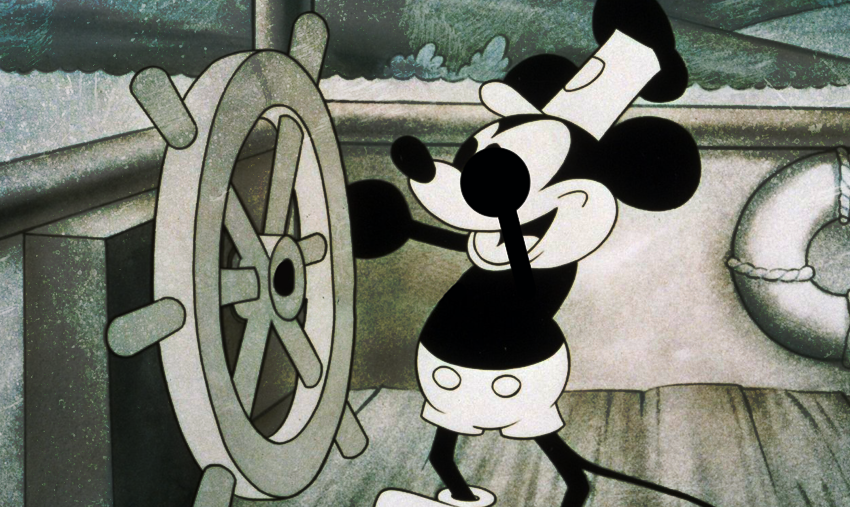Who performed all the voices in the early animated film Steamboat Willie?
Don't scroll until you've answered!

Duh! is a weekly column that gives circuitous answers to obvious questions. If you dig it, you can find 100 more of these essays in the Geeks Who Drink book, Duh!.
Maybe you heard about this: As of a month ago, Mickey Mouse is in the public domain.
It’s true: “Steamboat Willie,” that first-ever sound cartoon, that seven-minute showcase for livestock grunts and Mickey yelps performed by one Walter Elias Disney, is no longer protected by copyright in the United States. You can watch it on (non-Disney) YouTube right here:
The freeing of “Willie” got a lot of press not only because of Mickey’s high profile,1 but also because Disney (the company) was one of the main parties that had successfully lobbied Congress for a loooong extension of the copyright protection term–from 56 years to 75 years to ninety-five years,2 in a series of laws that came to be sardonically known as the “Mickey Mouse Protection Act.”
For artists who would have liked to get their mittless hands3 on the character, this was especially galling due to the irony hypocrisy involved: most of Disney’s bread-and-butter feature films are based on public-domain works. To pick just one example that wouldn’t be possible now, Sleeping Beauty came out a mere 70 years after the 1889 Tchaikovsky ballet it cribbed all its music from.
But never mind all that. As soon as open season was declared on the iconic rodent, the content-industrial complex swung into action. And just as with Winnie-the-Pooh a couple years back, the horror-industrial complex swung a little faster than everyone else:
- On Jan. 1, someone named Jamie Bailey announced a slasher flick called Mickey’s Mouse Trap. The logline: “A place for fun, a place for friends, a place for hunting. The mouse is out.”
- A day later, someone named Steven LaMorte announced a horror-comedy, this one without a title. His last movie, the 2022 Grinch parody The Mean One, has garnered a 22% rating on Rotten Tomatoes and 3.8/10 on IMDb, so this should be special.
- And then there’s
Infestation 88Infestation: Origins, the horror video game announced on New Year’s Day. This one got off to a great start: The game got its current title on Jan. 2, when we got the actual headline, “‘Steamboat Willie’ Horror Devs Claim They Weren’t Dropping Nazi References.”
You know what? That whole turning-Tchaikovsky-into-a-cartoon thing is sounding not so bad at the moment. Bring on the swans!
- By the way, Minnie also makes her less-than-dignified debut in the short: at her first appearance, a crane flips up her skirt and hooks her by the undies. It was one of several moments we’d think of as un-Disneylike today–see also the gross-out gags wherein Pete spits tobacco juice into his own face, and Mickey gets sprayed by a cow’s udder.
- In Congress’s defense, the world-standard Berne Convention has no flat numbers like these, but instead calls for a minimum of 50 years’ protection after the author’s death (in most of Africa and Asia, The Lord of the Rings just became fair game). Everyone who made “Willie” was young in 1928, so in those territories it entered the public domain just two years earlier.
- FYI, Mickey’s white gloves debuted in the 1929 films The Opry House and When the Cat’s Away, so they’re still protected for another year. His red shorts didn’t become a thing until the first color short, The Band Concert (1935).
